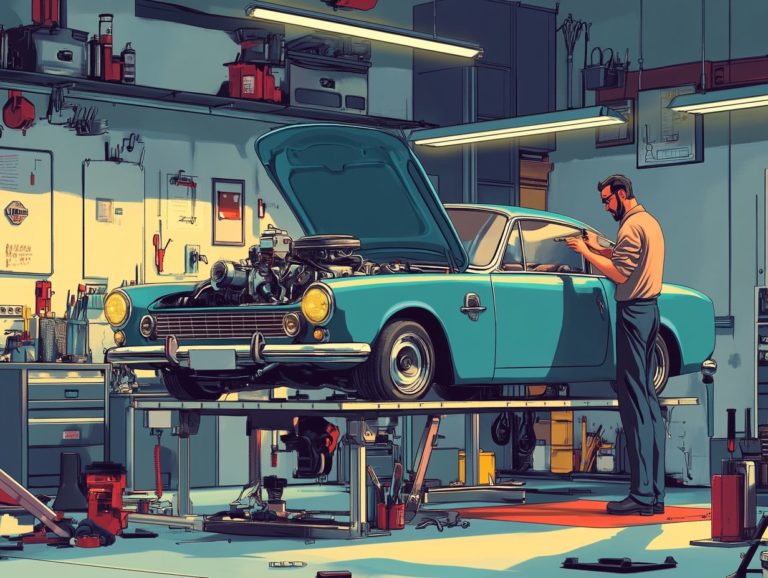How to Research Used Cars Effectively
Buying a used car can evoke a thrilling blend of excitement and apprehension. With many options at your fingertips, conducting thorough research becomes paramount to making the right choice.
This guide will illuminate the essential factors to consider, from establishing a realistic budget and assessing reliability to delving into the features that are most important to you.
It will point you toward trustworthy information sources, teach you how to evaluate a car s condition meticulously, and arm you with effective negotiation strategies. Get ready to hit the road with complete confidence!
Contents
- Key Takeaways:
- Researching Used Cars: An Overview
- Factors to Consider When Researching Used Cars
- Where to Find Information on Used Cars
- How to Evaluate Used Cars
- Negotiating and Making a Purchase
- Frequently Asked Questions
- What are the benefits of researching used cars effectively?
- What information should I gather when researching used cars?
- Where can I find reliable sources for researching used cars?
- What should I look for when inspecting a used car?
- How can I determine the fair market value of a used car?
- Is it necessary to get a vehicle history report when researching used cars?
Key Takeaways:

- Do thorough research to ensure you get the best deal when buying a used car.
- Consider factors such as price, reliability, and features when researching used cars.
- Utilize online resources and inspect the vehicle physically before negotiating and making a purchase.
Researching Used Cars: An Overview
Researching used cars is an essential step in your car-buying journey, and knowing how to understand used car reviews can empower you to make an informed decision when selecting a vehicle.
In today s automotive landscape, you ll encounter many options, from established dealerships to private sellers. It’s vital to weigh factors like dealership reputation, customer reviews, and vehicle history reports a report that shows a car’s past, including accidents and ownership history.
By diving into thorough research, you can pinpoint reputable dealers in Maryland, assess customer satisfaction through online feedback, and ultimately make a smart purchase that perfectly aligns with your needs and budget.
Why Research is Important
Researching before purchasing a used car is essential, as it empowers you to avoid hidden problems and ensures that you select a reliable vehicle tailored to your needs. Understanding the role of research in car negotiation can significantly enhance your buying experience.
By meticulously examining the accident history, reviewing comprehensive customer feedback, and utilizing detailed vehicle history reports, you can uncover critical insights that significantly influence your buying decision.
This diligence enhances your awareness of potential risks or recurring issues while giving you a clear picture of how well the vehicle has been maintained over time. Making informed decisions can lead to considerable savings on repairs and maintenance costs, allowing you to invest wisely while ensuring your new car remains in excellent condition for years to come.
Factors to Consider When Researching Used Cars
When looking into the world of used cars, several vital factors you should consider ensure a purchase that aligns perfectly with your unique needs and budget.
Pricing strategies are particularly important; grasping the market value of used cars empowers you to negotiate effectively.
Scrutinizing mileage is also important. Maintenance records, vehicle features, and overall quality will help unveil any potential hidden issues that could surface post-purchase.
By thoughtfully evaluating these elements, you can significantly enhance your chances of selecting a reliable vehicle that meets your expectations.
Price and Budget
Establishing a clear price and budget is essential when considering the purchase of a used car, as it directly influences the options available to you.
Understanding your financial parameters allows you to filter options more efficiently, ensuring that you don’t overspend and can manage ongoing costs comfortably.
Obtaining information about the values of used cars helps you distinguish between fair and inflated prices, which is crucial in the current market.
Exploring trade-in possibilities can also enhance your budget, creating space for better models or desirable features.
Effective negotiation skills are fundamental to ensuring your satisfaction; being informed about pricing strategies and market trends empowers you and facilitates a more enjoyable buying experience.
Reliability and Maintenance Costs
When choosing a used car, reliability and maintenance costs are critical. They significantly affect your long-term satisfaction and finances.
To assess a vehicle’s reliability, review its maintenance records. These documents reveal recurring issues and potential repairs.
Think about the customer support offered by the dealership or manufacturer. Good support can enhance your experience after the purchase.
Understanding warranty options is vital for covering unexpected expenses. Choose services that provide comprehensive care for your journey ahead.
Features and Options

Knowing the range of vehicles and their features is crucial. This knowledge helps you find a used car that fits your lifestyle.
When evaluating vehicles, focus on safety ratings and comfort features. These elements can greatly enhance your peace of mind.
Safety options like crash test ratings and driver-assistance technologies are essential. Modern technology, such as infotainment systems, can elevate your driving experience.
Space and comfortable seating transform every journey into a delightful ride. Read customer reviews to learn how these features perform in real-world scenarios.
Where to Find Information on Used Cars
Reliable information on used cars can greatly improve your buying experience. Whether you choose a dealership or a private seller, knowledge is power.
Online resources, like automotive websites and organizations, provide insights into dealership reputations and customer reviews. Use these tools to navigate the used car market confidently.
Online Resources
Platforms like Yelp and Google are invaluable for gathering information about used cars and dealerships. They offer customer reviews, ratings, and vehicle history reports.
Leverage this feedback to assess a dealership’s reliability. Understanding customer experiences influences your buying decisions.
Access comprehensive vehicle history reports to stay informed about a car’s past. This knowledge protects you from unexpected issues down the road.
Dealerships and Private Sellers
Exploring both dealerships and private sellers gives you many options when searching for a used car. Each has its advantages.
Dealerships offer a streamlined shopping experience with financing options and warranties. Private sellers can provide a personalized interaction and lower prices.
However, vehicle quality assurance might be less certain with private sales. Dealerships often excel in trade-in opportunities, making upgrades easier.
Understanding the pros and cons of each option is essential to making an informed choice.
How to Evaluate Used Cars
Evaluating used cars involves a thorough approach. Conduct a physical inspection, take a test drive, and review the vehicle history report.
Each step is crucial for making an informed decision that meets your needs.
Physical Inspection
Checking the used car is absolutely essential for uncovering any hidden issues that might slip under the radar of online listings or even during a quick test drive.
Start with an outward assessment. The condition of the paint, tires, and bodywork serves as your first clues to the vehicle’s overall care. As you move in closer, look for signs of rust, dents, or mismatched panels that could indicate past accidents.
Once inside, take note of the dashboard functionality, seat wear, and overall cleanliness. These factors reflect how well the car has been maintained. Your inspection checklist should prioritize crucial components like the engine and transmission. Checking fluid levels and looking for leaks can highlight potential problems.
Don t overlook the maintenance records; they are invaluable for revealing insights into past repairs and scheduled upkeep. They give you the power to make informed decisions while evaluating the vehicle’s quality.
Test Drive

Test driving a vehicle is an essential step in your used car buying journey. It provides you with the opportunity to evaluate both the dealership experience and the car’s performance firsthand.
During this crucial phase, you ll want to pay close attention to factors such as comfort, handling, and visibility. Notice how the car feels as you navigate different terrains. A smooth ride that aligns with your comfort preferences is key.
The way the vehicle handles turns and accelerates will reveal its responsiveness and ease of control. These elements are vital to an enjoyable driving experience. Visibility is also important. Take a moment to check sightlines and blind spots to ensure the vehicle offers safety alongside its stylish appeal.
Your interaction with the dealership staff is important. Their knowledge and support can greatly influence your decision-making process and shape your overall impression of the dealer. Engaging and attentive customer interactions often reflect the level of service you can expect long after the purchase is made.
Vehicle History Report
Obtaining a vehicle history report helps you understand the complete backstory of a used car, including its accident history and maintenance records.
This invaluable document acts as a comprehensive snapshot of the vehicle’s past, offering you critical insights into its reliability and overall condition. By accessing these reports through reputable services, you can uncover important details like title status, mileage records, and any potential salvage records.
While reviewing the report, pay close attention to any previous accidents or flood damage. These factors can significantly influence the car’s performance and longevity. Evaluating service records will also reveal whether the vehicle received regular maintenance, helping you assess the likelihood of future repairs and overall reliability.
Negotiating and Making a Purchase
Negotiating and making a purchase marks a pivotal moment in your used car buying journey. Act quickly to secure the best deal!
Here, effective communication and strategic pricing come together to create the foundation for a satisfying transaction.
Tips for Negotiating
Mastering the negotiation process is essential for securing a favorable deal when purchasing a used car. It ultimately enhances your satisfaction as a buyer.
To embark on this journey, begin by researching the vehicle’s market value. This knowledge gives you the power to recognize what a fair price looks like, thereby strengthening your position during negotiations.
Approach discussions with a mindset that embraces flexibility, but remain prepared to walk away if the terms don t meet your expectations. This strategy helps safeguard you from making impulsive decisions that you might later regret.
Reputable dealers play a significant role in facilitating fair negotiations. They prioritize customer satisfaction and transparency. This leads to a smoother and more trustworthy experience.
Finalizing the Purchase
Finalizing the purchase of a used car is the result of your careful research and negotiation efforts. Every detail can pave the way for a seamless transaction.
As the deal nears completion, it becomes essential for you to explore available warranty options. These options can provide you with peace of mind after the purchase.
Don t underestimate the value of after-sales support; it can greatly enhance your ownership experience. Engaging in meaningful conversations with the seller can uncover crucial insights into the car’s maintenance history.
By ensuring clarity on these aspects, you can confidently proceed, turning what could be a daunting process into a rewarding milestone in your automotive journey.
Frequently Asked Questions
What are the benefits of researching used cars effectively?

Researching used cars effectively can save you time and money while helping you find a reliable vehicle for your needs. Utilizing tips for researching used car prices allows you to make informed decisions and avoid potential scams or hidden issues.
What information should I gather when researching used cars?
When researching used cars, gather information such as the make, model, year, mileage, and any previous accidents or repairs. Make sure to research the average market value and the car s maintenance history.
Where can I find reliable sources for researching used cars?
There are many online platforms and resources that provide reliable information for researching used cars. These include reputable car review websites, online car marketplaces, and government agencies like the National Highway Traffic Safety Administration.
What should I look for when inspecting a used car?
When inspecting a used car, pay attention to its exterior and interior condition, engine and mechanical components, and any signs of damage or wear. It s also wise to take the car for a test drive to assess its performance.
How can I determine the fair market value of a used car?
To determine the fair market value of a used car, research its price through reputable sources like Kelley Blue Book or Edmunds. These websites provide information on average price ranges based on the car s condition, mileage, and location.
Is it necessary to get a vehicle history report when researching used cars?
Yes, obtaining a vehicle history report is highly recommended. This report provides details on the car’s ownership, accident history, maintenance records, and potential red flags. You can obtain it through online services like Carfax or AutoCheck.
For more resources and tips on buying a used car, visit reputable websites that specialize in automotive advice. Act quickly to secure the best options for your needs!






